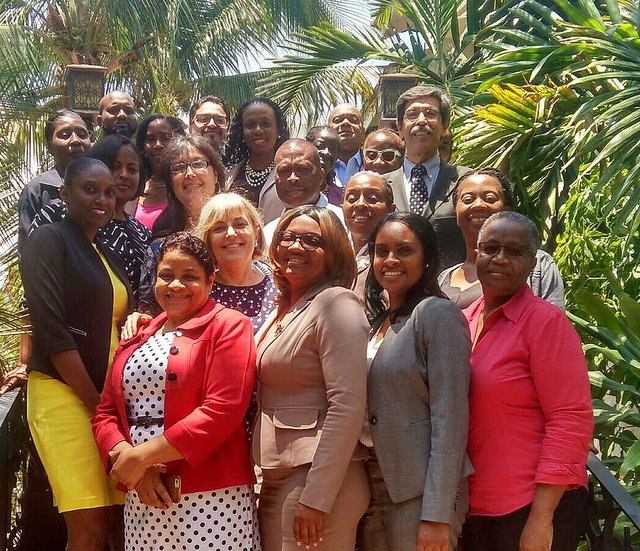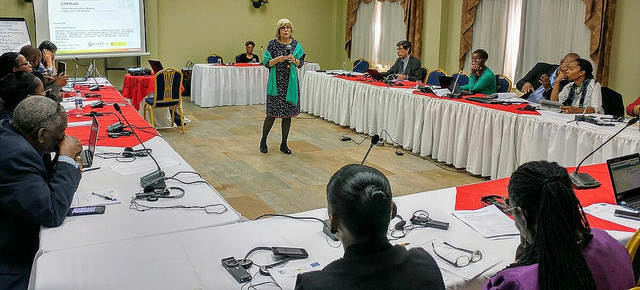New Online Courses for Caribbean countries
On 1 May started the first international edition of the online courses for the English-speaking Caribbean countries. CARICOM, PAHO/WHO, and CICAD-OAS are supporting this initiative, promoting the importance of these courses and the need to continue strengthening the competencies of the professionals in charge of planning and implementation of policies at the English Caribbean countries. The National Drug Councils of the countries are responding positively to this initiative, selecting targeted professionals to participate. Two courses will be implemented in this edition: "Use of Alcohol and other Drugs: Evidence-Based Prevention and "The Public Health Approach to Drugs Policies". The teaching and coordination work is being led by Jamaica.


Furthermore, COPOLAD maintains the invitation to CELAC countries to implement the online courses at the national level. The informative brochure has been "Virtual Courses, Latin America and the Caribbean" has been published and disseminated, presenting the characteristics and contents of the courses. Interested countries are implementing the courses without costs, neither for the country nor for the participants. Currently, Argentina, Chile, and Peru are implementing their national editions and re-editing them annually. Others like Bolivia, are starting their first national edition, while interest is growing among other countries.
22 CELAC countries validate and pilot COPOLAD quality criteria for accreditation of DDR programmes: Fieldwork begins to show first results
In Latin America, fifteen countries working on the validation and piloting of quality criteria for drug treatment programmes, and ten countries are doing the same with the prevention criteria. The Ibero-American Network of NGOs in the field of Drugs (RIOD) is also participating in both groups (prevention and treatment), including centres and programmes from its network, as a way of promoting the consideration of quality and evidence, among NGO. In the Caribbean, six countries are currently validating the criteria adapted to the context of the region, under the leadership of the National Drug Council of Trinidad & Tobago, along with the support of CARICOM.
-
The Latin American group validating the treatment criteria, is led by Chile through the National Service for the Prevention and Rehabilitation of Drug And Alcohol Consumption (SENDA) and formed by Argentina, Chile, Colombia, Costa Rica, Cuba, Ecuador, and Uruguay, on the advanced level, while El Salvador, Guatemala, Honduras, Mexico, Panama, Paraguay, Peru, and Venezuela, are working on the basic level.
-
The Latin American group validating the prevention criteria, is led by Costa Rica through the Costa Rican Institute on Drugs (ICD), and it is formed by Argentina, Chile, Colombia, Costa Rica, Guatemala, Honduras, Mexico, Panama, Peru, and Venezuela, which are contacting the programmes (from the school and community settings) that will be submitted to piloting.
-
In the Caribbean countries, an English language adaptation of prevention and treatment common criteria was carried out by a group of experts from the Bahamas, Grenada, Jamaica and Trinidad and Tobago, having previous experience in the formulation process of Standards in the framework of CARICOM.
- Bahamas, Guyana, Antigua & Barbuda and Dominica will pilot the prevention criteria
- St. Lucia and Trinidad & Tobago will pilot the treatment criteria.
- Jamaica has taken on the challenge of validating both prevention and treatment.
CARICOM convened these countries to a working meeting in Kingston, Jamaica (18-19 April), in which participants from National Drug Commissions were trained in the piloting methodology supported by COPOLAD professionals. On 20 April 2018, a second meeting of the group of experts was set up in Kingston, Jamaica, to coordinate the next steps, in the framework of the COPOLAD Programme on this field.
In this way, the three groups of countries are advancing steadily in the process of validating the quality and evidence-based criteria, which will lead to the institutional strengthening for the accreditation of DDR programmes in the CELAC region.
The quality standards system of the COPOLAD project is organized according to the scope of intervention, the level of demand and the nature of the standard. The total system comprises a total of 174 criteria, which are clasified according to the scope of intervention in 25 criteria common to any DDR programme, 52 criteria on prevention, 5 on risk reduction, 53 on treatment, 5 on harm reduction and 34 on social integration.
As a prior step to piloting, the groups of participating countries formed teams of experts to revise each of these criteria and adapt it to the local language, considering cultural, legal and linguistic factors. This work was supported by COPOLAD through the methodological orientation by the Task Force coordinator of this area, by the operative accompaniment of the respective Working Group Coordinators from the leading countries, Chile, Costa Rica and Trinidad & Tobago. The leadership of the National Commissions of each of these countries, SENDA, ICD, and NDC have proved fundamental, which hard work was successfully concluded.
After the approval of the linguistic adaptation agreed standards were integrated with other quality systems such as the one proposed by CICAD and CARICOM. In that way, the piloting protocol was defined and the construction process of the field instrument was initiated by the Caribbean Expert Group, with the active participation of members of the Advisory Council, PAHO/WHO, and CICAD-OAS. COPOLAD commends the commitment and coordination capacity in this project, in which 22 national drug commissions converge, and the active participation of all the entities involved, in a remarkable and effective collaborative work.




